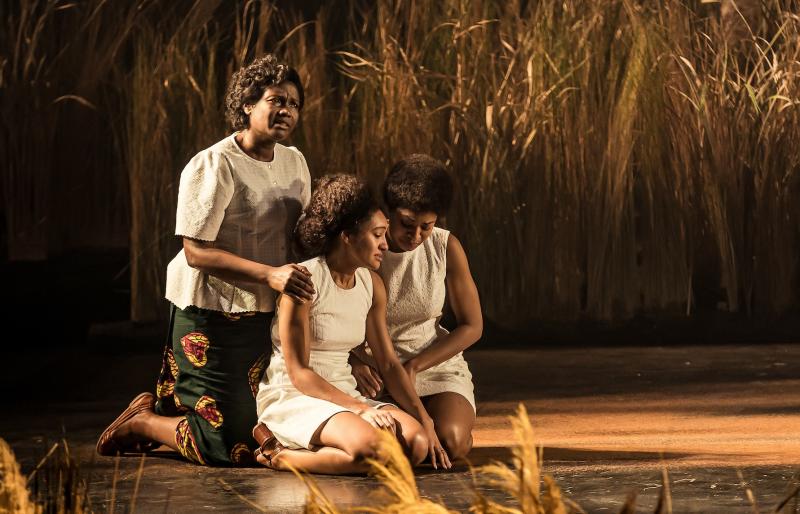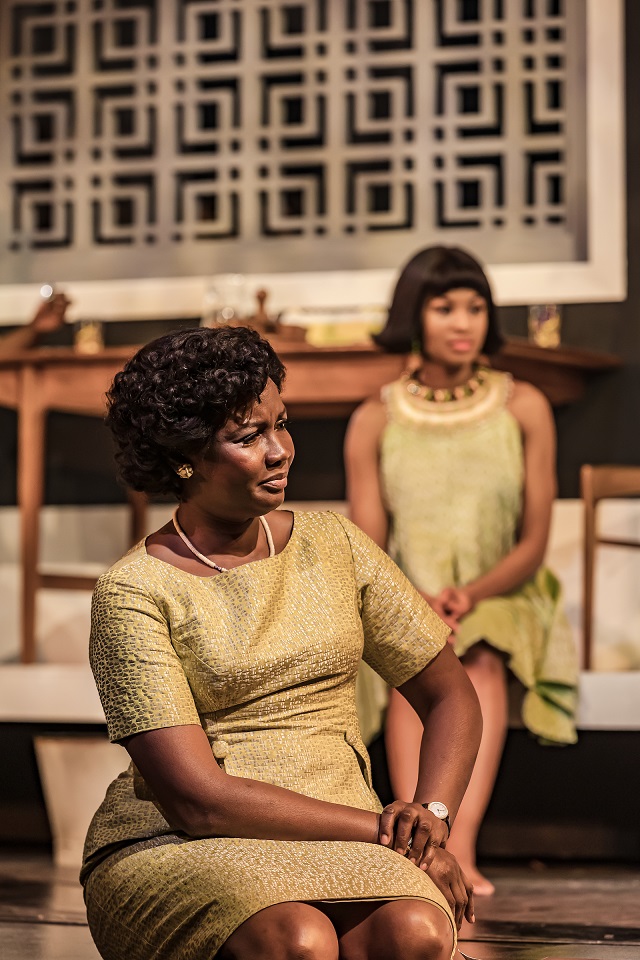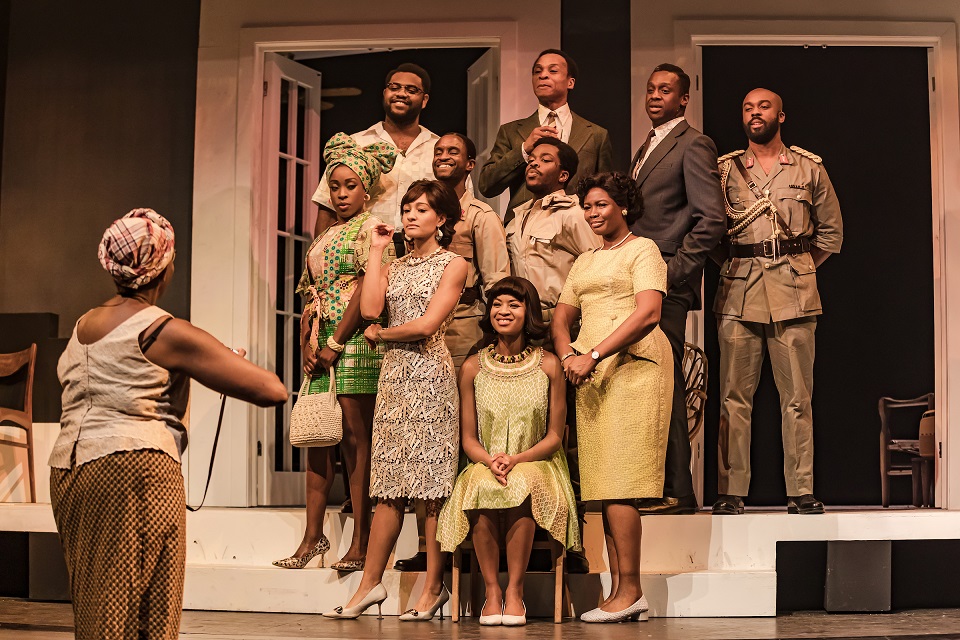Three Sisters, National Theatre review - Chekhov in time of war | reviews, news & interviews
Three Sisters, National Theatre review - Chekhov in time of war
Three Sisters, National Theatre review - Chekhov in time of war
Relocation from the Russian provinces to Sixties Biafra brings insight and immediacy

Inua Ellams’ Three Sisters plays Chekhov in the shadow of war, specifically the Nigerian-Biafran secessionist conflict of the late 1960s which so bitterly divided that newly independent nation.
It’s a revealing adaptation from the writer of 2017's acclaimed Barber Shop Chronicles, one that maintains much of the spirit of the original while transplanting it to a dramatically different world (though some of the textual balances perhaps feel stretched in this new world, the story’s personal loyalties rather overshadowed, or undercut by the new circumstances). We sense that new context from the start, with the first character brought on stage by director Nadia Fall a “Chant Poet”, a ceremonially costumed, almost shamanic presence who, chorus-like, accompanies the scene changes. Though it’s not overegged into any direct contrast between true “native” opposed to false “adopted” habits, that element references different, deeper levels of local lore than those suggested by the civilised bungalow lifestyle, a clear colonialist inheritance, that the Onuzo family enjoy. (Pictured below, Sarah Niles, Racheal Ofori.) Designer Katrina Lindsay’s stylish Sixties costumes present Racheal Ofori, as the youngest sister Udo, and her older sibling Nne Chukwu (Natalie Simpson) whose disillusion is here clarified by the fact that her marriage was arranged for her when she was 12, almost as fashion models from the pages of some glossy magazine – “Lagos Life”, in this case, the sisters’ “city of dreams” here represented by that African metropolis.
 Such additions and transformations are much deeper than merely decorative, even if the palm wine goes down a treat for “Uncle” Eze (Jude Akuwudike, an entrancing performance), taking the role of Chekhov’s army doctor Chebutykin, when he’s on a binge. Issues of politics are in the open here, expressed in the hopes and fears that Ellams’ characters articulate for Biafra’s survival as an independent Igbo nation (the departure of the army in the final scene follows directly on from its 1970 surrender to the Nigerian federalist army).
Such additions and transformations are much deeper than merely decorative, even if the palm wine goes down a treat for “Uncle” Eze (Jude Akuwudike, an entrancing performance), taking the role of Chekhov’s army doctor Chebutykin, when he’s on a binge. Issues of politics are in the open here, expressed in the hopes and fears that Ellams’ characters articulate for Biafra’s survival as an independent Igbo nation (the departure of the army in the final scene follows directly on from its 1970 surrender to the Nigerian federalist army).
Eldest sister Lolo (Sarah Niles) is a keen student of issues of post-colonialism, wiser by far than the military men who surround her, only too aware of the enduringly deep influence of the British occupiers: Dimgba, the Onuzo brother, has a Cambridge PhD that he senses is useless in this new world; when they have a singalong it’s to western pop hits, and even Blue Peter has become a shared frame of reference. There’s a sense, however, that Ellams is sometimes articulating his own point of view more than that of his characters in some of the dialogue, however acute the insights may be. Peter Bankole’s Nmeri, the idealistic suitor of youngest sister Udo, encapsulates the long process of withdrawal from colonialist influence with brilliant concision: “If you stick a knife in my back and pull it out nine inches, that’s not progress. Pull it out completely, that’s not progress. Progress starts when the wound heals.”
Ellams describes his play as “after Chekhov” and the difference of tone is appreciable, his characters dialling down the “incremental disappointment” – what a lovely summation of the quintessential Chekhovian mood that phrase is – often associated with the piece for sometimes ebullient comedy. If last night’s audience was anything to go by, those elements should work very well as the run progresses even if, for some, the richness of language takes a while to absorb (the effect goes beyond the merely demotic into a lexicon almost its own, one which definitely repays the effort, as when a character’s mental illness is described: “her wire no dey touch correct”). At a tad over three hours it’s not a short evening, and some blurring feels evident in the final act, with Ellams introducing a theme of proprietary displacement that's carried over from The Cherry Orchard. (That play’s sense of the old order changing is nicely enhanced here by the fact that when Abosede – Chekhov’s unbearably motherly Natasha, here finely played by Ronke Adekoluejo – finally asserts control over the family home, she is endorsing her Yoruba identity over her Igbo sisters-in-law, as well as getting sweet revenge on them for having called her a “bush animal”.) But this Three Sisters, confidently played by its ensemble cast (pictured above) and technically accomplished on all fronts (plaudits for Peter Mumford’s atmospheric lighting and Donato Wharton’s sound design), brings a real breath of fresh air to the National.
At a tad over three hours it’s not a short evening, and some blurring feels evident in the final act, with Ellams introducing a theme of proprietary displacement that's carried over from The Cherry Orchard. (That play’s sense of the old order changing is nicely enhanced here by the fact that when Abosede – Chekhov’s unbearably motherly Natasha, here finely played by Ronke Adekoluejo – finally asserts control over the family home, she is endorsing her Yoruba identity over her Igbo sisters-in-law, as well as getting sweet revenge on them for having called her a “bush animal”.) But this Three Sisters, confidently played by its ensemble cast (pictured above) and technically accomplished on all fronts (plaudits for Peter Mumford’s atmospheric lighting and Donato Wharton’s sound design), brings a real breath of fresh air to the National.
The future of Arts Journalism
You can stop theartsdesk.com closing!
We urgently need financing to survive. Our fundraising drive has thus far raised £49,000 but we need to reach £100,000 or we will be forced to close. Please contribute here: https://gofund.me/c3f6033d
And if you can forward this information to anyone who might assist, we’d be grateful.

Subscribe to theartsdesk.com
Thank you for continuing to read our work on theartsdesk.com. For unlimited access to every article in its entirety, including our archive of more than 15,000 pieces, we're asking for £5 per month or £40 per year. We feel it's a very good deal, and hope you do too.
To take a subscription now simply click here.
And if you're looking for that extra gift for a friend or family member, why not treat them to a theartsdesk.com gift subscription?
more Theatre
 The Weir, Harold Pinter Theatre review - evasive fantasy, bleak truth and possible community
Three outstanding performances in Conor McPherson’s atmospheric five-hander
The Weir, Harold Pinter Theatre review - evasive fantasy, bleak truth and possible community
Three outstanding performances in Conor McPherson’s atmospheric five-hander
 Dracula, Lyric Hammersmith review - hit-and-miss recasting of the familiar story as feminist diatribe
Morgan Lloyd Malcolm's version puts Mina Harkness centre-stage
Dracula, Lyric Hammersmith review - hit-and-miss recasting of the familiar story as feminist diatribe
Morgan Lloyd Malcolm's version puts Mina Harkness centre-stage
 The Code, Southwark Playhouse Elephant review - superbly cast, resonant play about the price of fame in Hollywood
Tracie Bennett is outstanding as a ribald, riotous Tallulah Bankhead
The Code, Southwark Playhouse Elephant review - superbly cast, resonant play about the price of fame in Hollywood
Tracie Bennett is outstanding as a ribald, riotous Tallulah Bankhead
 Reunion, Kiln Theatre review - a stormy night in every sense
Beautifully acted, but desperately grim drama
Reunion, Kiln Theatre review - a stormy night in every sense
Beautifully acted, but desperately grim drama
 The Lady from the Sea, Bridge Theatre review - flashes of brilliance
Simon Stone refashions Ibsen in his own high-octane image
The Lady from the Sea, Bridge Theatre review - flashes of brilliance
Simon Stone refashions Ibsen in his own high-octane image
 Romans: A Novel, Almeida Theatre review - a uniquely extraordinary work
Alice Birch’s wildly epic family drama is both mind-blowing and exasperating
Romans: A Novel, Almeida Theatre review - a uniquely extraordinary work
Alice Birch’s wildly epic family drama is both mind-blowing and exasperating
 The Producers, Garrick Theatre review - Ve haf vays of making you laugh
You probably know what's coming, but it's such great fun!
The Producers, Garrick Theatre review - Ve haf vays of making you laugh
You probably know what's coming, but it's such great fun!
 Not Your Superwoman, Bush Theatre review - powerful tribute to the plight and perseverance of Black women
Golda Rosheuvel and Letitia Wright excel in a super new play
Not Your Superwoman, Bush Theatre review - powerful tribute to the plight and perseverance of Black women
Golda Rosheuvel and Letitia Wright excel in a super new play
 Cow | Deer, Royal Court review - paradox-rich account of non-human life
Experimental work about nature led by Katie Mitchell is both extraordinary and banal
Cow | Deer, Royal Court review - paradox-rich account of non-human life
Experimental work about nature led by Katie Mitchell is both extraordinary and banal
 Deaf Republic, Royal Court review - beautiful images, shame about the words
Staging of Ukrainian-American Ilya Kaminsky’s anti-war poems is too meta-theatrical
Deaf Republic, Royal Court review - beautiful images, shame about the words
Staging of Ukrainian-American Ilya Kaminsky’s anti-war poems is too meta-theatrical
 Laura Benanti: Nobody Cares, Underbelly Boulevard Soho review - Tony winner makes charming, cheeky London debut
Broadway's acclaimed Cinderella, Louise, and Amalia reaches Soho for a welcome one-night stand
Laura Benanti: Nobody Cares, Underbelly Boulevard Soho review - Tony winner makes charming, cheeky London debut
Broadway's acclaimed Cinderella, Louise, and Amalia reaches Soho for a welcome one-night stand
 The Pitchfork Disney, King's Head Theatre review - blazing with dark energy
Thrilling revival of Philip Ridley’s cult classic confirms its legendary status
The Pitchfork Disney, King's Head Theatre review - blazing with dark energy
Thrilling revival of Philip Ridley’s cult classic confirms its legendary status

Add comment